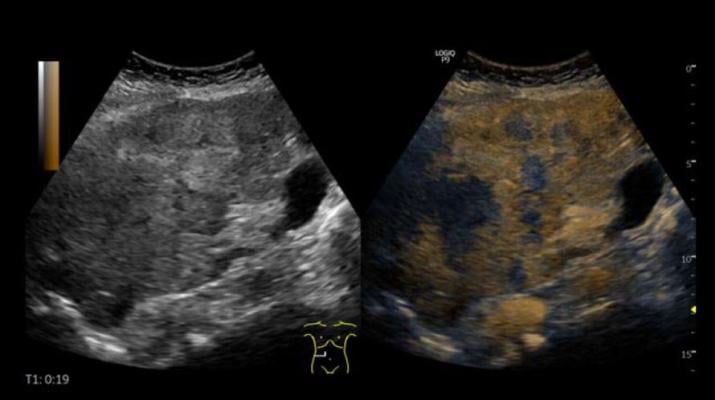
Image courtesy of GE Healthcare
February 24, 2023 — Contrast-enhanced ultrasound (CEUS) is more accurate and reliable than MRI for examining certain liver and kidney nodules, according to two new studies published in the Journal of Ultrasound in Medicine (JUM) and highlighted by the International Contrast Ultrasound Society (ICUS).
“We found that CEUS is a better and less expensive first-step evaluation for newly-discovered liver nodules,” said Dr. Stephanie Wilson, principal investigator of the liver CEUS study, which followed 196 patients at the University of Calgary for two years. Dr. Wilson is a clinical professor of radiology and gastroenterology at the University of Calgary and Co-President of ICUS.
“CEUS found malignant or pre-malignant diagnoses that would likely have been missed or delayed if we had not used CEUS in these patients,” according to Dr. Wilson.
“In addition, CEUS quickly and reliably identified benign lesions and pseudo-lesions, sparing these patients the costs and risks associated with unnecessary downstream testing and procedures,” she added.
This study shows that CEUS scans are at least equivalent if not superior to MRI for evaluating these liver lesions, and CEUS should be the first investigation for nodules found on surveillance for liver cancer, according to Dr. Wilson.
She called upon the American Association for the Study of Liver Diseases (AASLD) to include CEUS in its liver imaging guidelines, along with MRI and CT.
Meanwhile, an Ohio team reviewed clinical data over a 10 year period to assess the accuracy of CEUS diagnoses of benign kidney nodules in 341 patients. Their blinded analysis found that none of the CEUS diagnoses changed during that period.
“Our data confirm that when CEUS determines a kidney mass is benign, the mass is benign and no further follow up is needed -- sparing the patient from unnecessary downstream tests, anxiety and costs,” according to Dr. Richard G. Barr, the lead author of the kidney CEUS study. Dr. Barr is a professor of radiology at the Northeast Ohio Medical University and treasurer of ICUS.
CEUS is a non-invasive imaging tool that is safely and routinely used worldwide to help identify and characterize cancers, diagnose heart and vascular disease, monitor chronic gastro-intestinal diseases and monitor therapy.
Ultrasound contrast agents are administered intravenously to enhance the images produced by ultrasound scans, allowing for visualization of abnormal microvascular blood flow patterns in real time.
“It is important to remember that ultrasound contrast agents do not contain iodinated dye and do not harm the kidneys, making CEUS the examination of choice for patients with renal insufficiency,” according to Dr. Barr.
“In addition, CEUS allows for improved visualization of enhancement patterns in real time, the thin slice thickness of CEUS allows for evaluation of small nodules, multiplanar imaging allows for improved visualization and confirmation of enhancement, and multiple doses may be used during the same examination to provide an opportunity to image the lesion thoroughly,” Dr. Barr said.
Since kidney masses are often found on imaging for other indications, CEUS offers an essential imaging option because it is safe, accurate, low-cost, radiation-free and can help these patients avoid additional unnecessary tests and surgery, he added.
“Further, due to radiation exposure associated with CT, we believe CT should not be used as the first line imaging modality for assessing cystic lesions that are most probably benign in character,” Dr. Barr said, citing the FDA’s recent white paper addressing unnecessary radiation exposure from medical imaging.
Many urologists are now also finding that CEUS is essential for diagnosing indeterminate kidney masses.
“If CEUS shows concern for malignancy of renal masses, we have complete confidence in proceeding with treatment; and if CEUS confirms a lesion to be benign our Urology group feels equally assured that it is safe to follow such lesions over time and to forego treatment,” said Dr. Daniel Ricchiuti, a urologist in Boardman, Ohio.
The Canadian liver study represents the first prospective comparison of CEUS and contrast-enhanced MRI for assessment of newly-discovered liver nodules, according to Dr. Wilson.
She said her study showed that CEUS offers superior sensitivity when compared to MRI (81% vs 64%) for the diagnosis of malignancy, without compromising specificity (92% vs. 93%). In addition, CEUS was more likely than MRI to reproduce and characterize the nodule found on screening (97% vs. 78.5%).
Nonetheless, MRI remains an essential tool for managing patients with malignant tumors, particularly for staging these tumors prior to treatment, according to Dr. Wilson.
Four ultrasound contrast agents are available in various countries around the world: Sonovue (Lumason in the USA), manufactured and sold by Bracco; Definity (Luminity in Europe), manufactured and sold by Lantheus; and Optison and Sonazoid, manufactured and sold by GE Healthcare.
For more information: www.icus-society.org


 September 15, 2025
September 15, 2025 









